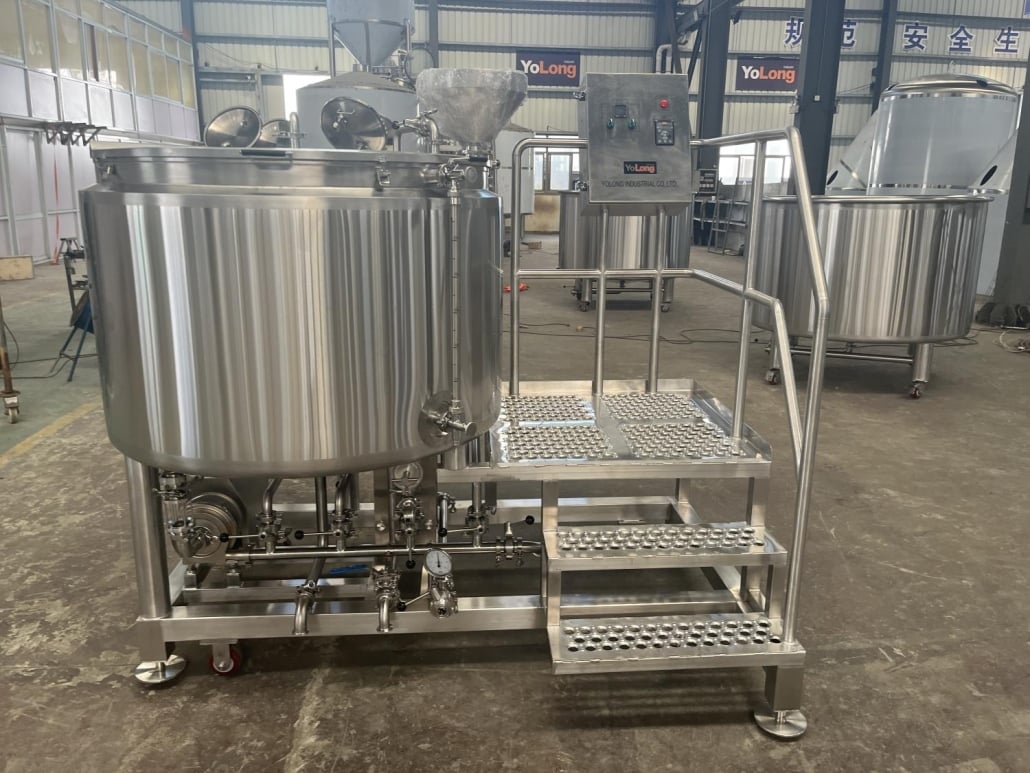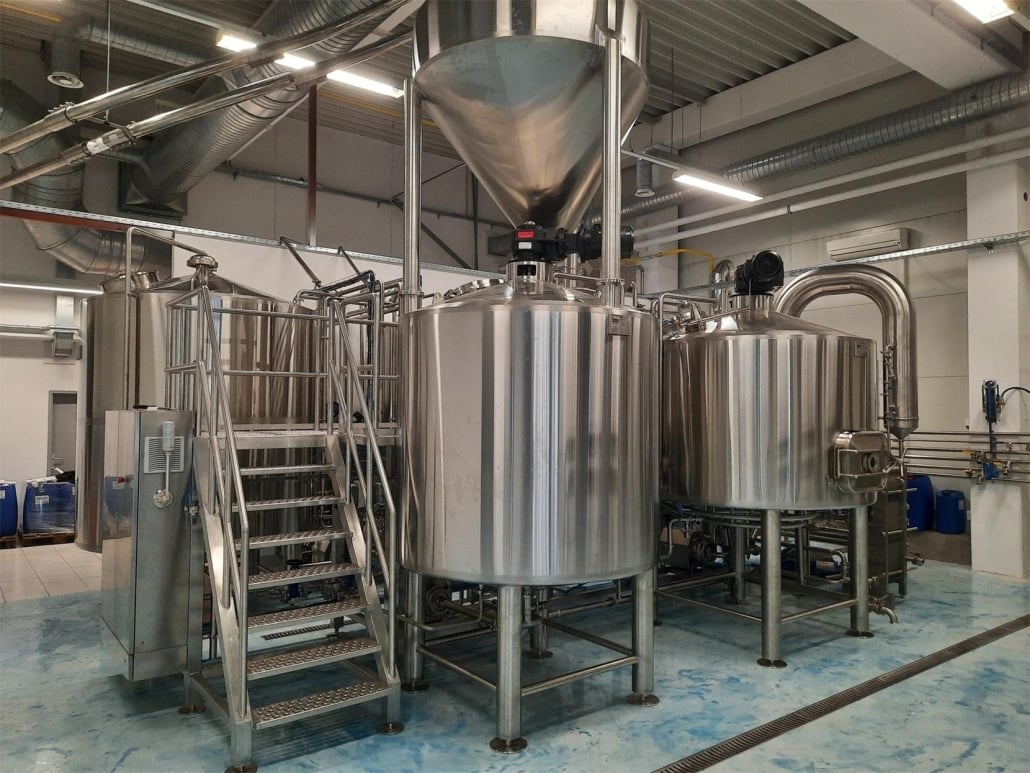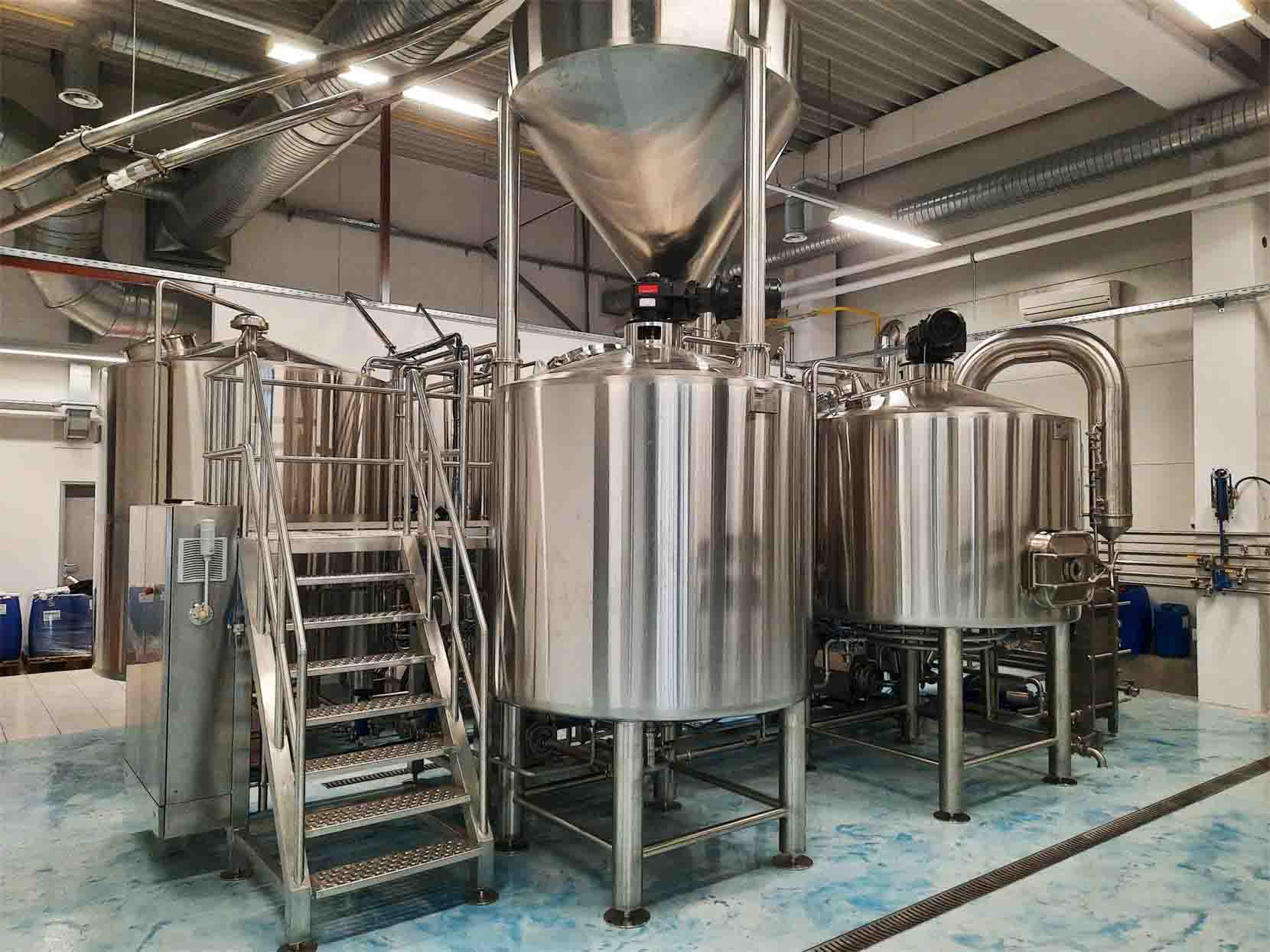4 vessel brewing system
For passionate brewers yearning to elevate their craft from homegrown to professional-grade, the 4 vessel brewing system beckons as the ultimate prize. Imagine – a symphony of stainless steel vessels, each meticulously designed to orchestrate a flawless brewing performance, consistently producing award-winning pints that would make any brewpub proud. But before you dive headfirst into this world of gleaming tanks and bubbling wort, let’s embark on a journey to demystify the 4 vessel brewing system, exploring its intricacies, advantages, and considerations.
Unveiling the Powerhouse: Equipment Guide
A 4 vessel brewing system is the gold standard for commercial breweries, offering unparalleled control and efficiency over the brewing process. Unlike its 2 vessel counterpart, which combines functionalities, the 4 vessel system boasts dedicated vessels for each crucial stage:
- Mash Tun: Here, the crushed grains (malt) mingle with hot water, releasing the fermentable sugars that form the foundation of your beer.
- Lauter Tun: This vessel acts as a separator, filtering the sweet liquid (wort) from the spent grains, ensuring a crystal-clear base for your brew.
- Kettle: The wort takes center stage in the kettle, where it’s brought to a boil, hops are added for bitterness, aroma, and flavor, and the wort is further clarified.
- Whirlpool: This ingenious tank creates a whirlpool motion, centrifuging the wort and removing any residual hop particles and trub, resulting in a polished and hop-forward final product.
Table: Equipment Breakdown of a 4 Vessel Brewing System
| Equipment | Description |
|---|---|
| Mash Tun | Insulated vessel for steeping crushed grains in precisely controlled hot water to extract fermentable sugars. |
| Lauter Tun | Vessel featuring a false bottom with a specific gap size, allowing wort to drain while retaining spent grains. |
| Kettle | Large vessel equipped with a heating element for boiling the wort, adding hops, and clarifying the liquid. |
| Whirlpool | Cylindrical tank with a tangential inlet that creates a whirlpool motion to separate hot wort from hop particles and trub. |

The Brewing Symphony: Process Breakdown
The magic unfolds within these vessels, meticulously orchestrated to transform humble ingredients into liquid gold. Here’s a glimpse into the brewing process facilitated by a 4 vessel system:
- Mashing: Grain is loaded into the mash tun, where it steeps in precisely heated water for a predetermined time. Enzymes within the grain convert starches into fermentable sugars, creating the sweet wort that forms the base of your beer.
- Lautering: The wort is transferred to the lauter tun, where the ingenious false bottom allows the sweet liquid to drain through, leaving the spent grains behind. A clear and flavorful wort emerges, ready for the next stage.
- Boiling: The precious wort journeys to the kettle, where it’s brought to a vigorous boil. This step serves multiple purposes: it sterilizes the wort, concentrates its sugars, and activates specific hop compounds for bitterness, aroma, and flavor.
- Whirlpooling: The hot wort takes a final spin in the whirlpool. The centrifugal force created by the vortex separates any residual hop particles and trub, leaving behind a polished and hop-forward wort, primed for fermentation.
This meticulous, multi-vessel approach allows for precise control over each step, ensuring optimal sugar extraction, efficient lautering, and a beautifully clarified wort for a consistently high-quality final product.
Capacity, Space, Design & Customization
Choosing the right 4 vessel brewing system is akin to selecting the perfect instrument for your brewing orchestra. Here are key factors to consider:
Capacity: Brewery size dictates capacity needs. Systems range from compact 1-barrel setups to industrial-sized 100-barrel behemoths. Consider your production goals and available space.
Space: These systems have a footprint! Measure your designated brewing area meticulously to ensure your chosen system fits comfortably. Remember, you’ll also need space for cleaning, fermentation vessels, and packaging equipment.
Design & Layout: 4 vessel systems come in various configurations. Evaluate your workflow and choose a layout that optimizes efficiency. For instance, some systems feature integrated heat exchangers for wort cooling, minimizing space requirements.
Customization: Many manufacturers offer customization options. Consider features like automated controls, integrated CIP (Cleaning In Place) systems, and specialized valves to streamline your brewing process.
Brewer’s Dream Machine: Unveiling the Price Tag
The allure of a 4 vessel brewing system is undeniable, but with great power comes great…responsibility (and cost!). Here’s a breakdown of the price range to help you navigate this investment:
Price Range of 4 Vessel Brewing Systems (USD)
| Capacity (Barrels) | Price Range (Estimated) |
|---|---|
| 1 | $25,000 – $50,000 |
| 3 | $40,000 – $75,000 |
| 5 | $60,000 – $100,000 |
| 10 | $80,000 – $150,000+ |
Remember, these are ballpark figures. The final cost can vary depending on factors like:
- Material: Stainless steel quality significantly impacts price. Opting for higher-grade stainless steel increases durability but also the price tag.
- Features: Automation, integrated heat exchangers, and specialized valves add convenience but come at a premium.
- Brand Reputation: Established brands with a proven track record often command higher prices.
Beyond the initial investment, consider ongoing costs:
- Installation: Professional installation ensures proper setup and functionality, incurring additional expense.
- Maintenance: Regular cleaning and upkeep are crucial. Factor in cleaning solutions and spare parts.
- Utilities: Heating, cooling, and pumping wort require significant energy consumption.
Is a 4 vessel system right for you? Carefully evaluate your production goals, budget, and available space. For passionate homebrewers yearning to experiment with small batches, a smaller system might suffice. However, for aspiring professional brewers aiming for consistent, high-volume production, a 4 vessel system can be a game-changer.
From Inspiration to Installation: A Practical Guide
So, you’ve decided to embark on the exciting journey of acquiring a 4 vessel brewing system! Here’s a roadmap to guide you through the process:
Table: The 4 Vessel Brewing System Acquisition Journey
| Stage | Description |
|---|---|
| Research & Planning | Define your needs (capacity, features), research reputable manufacturers, compare quotes, and factor in additional costs (installation, maintenance). |
| Contacting Suppliers | Engage with shortlisted manufacturers. Discuss customization options, request detailed quotes, and inquire about lead times. |
| Site Preparation | Ensure your designated brewing area meets space requirements for the chosen system, including access to utilities (water, drainage, power). |
| Financing | Explore financing options if needed. Consider loans or equipment leasing programs offered by some manufacturers. |
| Installation & Training | Schedule professional installation to ensure proper setup and functionality. Request comprehensive training on operating and maintaining your system. |
Pro Tip: Don’t be afraid to negotiate! Manufacturers are often willing to work with serious buyers, especially for larger systems.
Pros & Cons of 4 Vessel Systems
While the allure of a 4 vessel system is undeniable, it’s essential to weigh the advantages and limitations before taking the plunge.
Table: Pros & Cons of 4 Vessel Brewing Systems
| Pros | Cons |
|---|---|
| Unparalleled Control | Precise control over each brewing stage for consistent, high-quality beer. |
| Increased Efficiency | Dedicated vessels streamline the brewing process, saving time and labor. |
| Scalability | Upgrade capacity by adding fermenters and brite tanks as your business grows. |
| Professional Image | Projects a professional image, fostering trust with customers and distributors. |
| Higher Investment | Significant upfront cost compared to smaller brewing systems. |
| Increased Footprint | Requires ample space to accommodate the system and related equipment. |
| Complexity | Requires a higher level of brewing knowledge and expertise to operate effectively. |
| Maintenance Demands | Regular cleaning and maintenance are crucial for optimal performance. |
Ultimately, the decision hinges on your specific needs and aspirations. If you envision a future of crafting exceptional beers on a larger scale, a 4 vessel system can be a worthwhile investment. However, for smaller breweries with more modest production goals, alternative brewing systems might be a more practical option.

FAQs
Table: 4 Vessel Brewing System FAQs
| Question | Answer |
|---|---|
| What are the benefits of a 4 vessel system over a 2 vessel system? | While both systems can produce delicious beer, a 4 vessel system offers several advantages: * Greater control: Dedicated vessels allow for finer control over each brewing stage, resulting in more consistent and higher-quality beer. * Increased efficiency: Separate vessels enable brewers to multitask, like lautering one batch while mashing another, significantly boosting production output. * Improved clarity: The whirlpool effectively removes hop particles and trub, leading to a crystal-clear wort and a more polished final product. |
| Is a 4 vessel system overkill for a homebrewer? | For most homebrewers, a smaller system (1-3 barrels) is perfectly adequate. 4 vessel systems are better suited for aspiring professional brewers aiming for larger production volumes and consistent quality. |
| What brewing knowledge is required to operate a 4 vessel system? | A solid understanding of brewing principles and experience with smaller brewing systems are essential. Many manufacturers offer training programs to familiarize users with the specific operation and maintenance of their systems. |
| How much maintenance does a 4 vessel system require? | Regular cleaning and sanitation are crucial to prevent contamination and ensure optimal performance. The frequency depends on your brewing schedule, but plan for cleaning after each brew day. Manufacturers typically provide detailed cleaning procedures. |
| What are some reputable manufacturers of 4 vessel brewing systems? | Conduct thorough research to find a manufacturer that aligns with your needs and budget. Some well-regarded brands include SsV Limited, Micet Craft Brewing Equipment, and ABS Commercial. |
| Where can I find financing options for a 4 vessel system? | Explore options like small business loans or equipment leasing programs offered by some manufacturers. Carefully evaluate interest rates and repayment terms before making a decision. |
By delving into these FAQs, you’ve gained valuable insights into the world of 4 vessel brewing systems. Remember, this is an investment that requires careful consideration. Weigh the pros and cons, assess your brewing aspirations, and embark on this exciting journey with a well-informed plan.
Share this entry
Interested in learning more about Brewing Systems including additional details and pricing information? Please use the form below to contact us!
YOLONG BREWERY EQUIPMENT FAQS
- Commercial Brewery / Craft Brewery / Microbrewery / Nanobrewery
- What is The Difference Between Craft Beer and Industrial Beer?
- The Bespoke Differences In Custom Brewing Systems
- Everything You Need to Know About Kettle Souring
- How to Choose Brewing Equipment for Your business?
- How To Choose The-Best Partner To Build Your Commercial Microbrewing System?
- Two Detection Sensors That You Need To Use In Your Brewhouse System
- Remote Control Applications in Brewing Equipment/How does it work?
- How To Clean Your Brand New Brewery Tanks?

